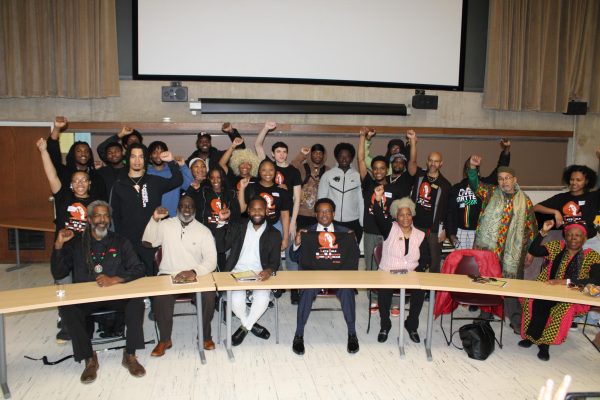Uncovering a “too good to be true” business opportunity
A friend I hadn’t talked to in over a year called me about a month ago and gave me some pitch about how he just started his own business through a company called ACN – American Consumer’s Network. I could tell immediately that he was reading off some sort of script, but I gave him a chance. He said it was a great opportunity to make easy money, and that I wouldn’t have to quit my actual job, so I told him he could come over to my house the next day to explain it in more detail.
We sat down at my kitchen table, and he began to explain that in ACN you’re not a salesman because you don’t sell anything to people; you save them money by offering them products like phone service, cable and gas for cheaper than what they already pay.
I argued with him over this because to me, it sounded a bit like being a salesman, despite whether you’re saving people money or not. You still have to sell people on the idea and get them to switch to your product. He wouldn’t agree with me on this for whatever reason, so I let it go. He then pulled an iPad out of his briefcase and showed me his “store-front.”
He typed in some login information and proceeded to show me a simple website listing all the products offered by ACN. He made sure to point out that his name was at the top left, and thought that was real cool. After all of this, he finally told me the catch – it costs 500 dollars to sign up and become an “IBO” (independent business owner).
I asked him what materials or supplies they provided you with for your money, and was informed that they give you everything you need – your own store front. Your “store front” is just a very simple, badly designed website with your name in the top left corner.
I then told him I didn’t really want to make that kind of investment at the moment and didn’t really have the time. He told me I had to come to a presentation next week and that he promised me it would change my mind. It was on a Thursday night, and I didn’t work or have plans, so I agreed to go.
The presentation was in the basement of a bowling alley in Orchard Park. It was basically a really small banquet hall with about eight round tables, a projector screen, speakers and a banner displaying “ACN”. Pop music with lyrics about success was playing a bit too loudly and people dressed way too nicely to be in the basement of a bowling alley were periodically walking in. There were only about 15 people there by the time the presentation started, ages ranging from 18 to about 50.
It started off with a middle-aged guy talking about how proud of his son he was to have joined the family business and how he had done so well so far. He started clapping, everyone joined, and his son who looked about 25 took his place. He started talking about how much ACN had made a positive impact on his life and how it gave him direction and purpose.
It was obvious that he had made the same speech about a hundred times before. When he made a joke or sarcastic remark someone from the audience, usually his mom or dad, would laugh or say something like, “so true!” or, “too funny!” It was painfully obvious that they were waiting for him to say it, as if on cue. The thing that turned me off the most about the experience was how fake and disingenuous everyone seemed. It gave me a great lack of trust towards the whole thing.
The business model for ACN is basically business for dummies. There is an exact script for every situation, whether it’s calling someone to get them to come to a presentation or getting a customer to switch to ACN’s services. Using your own methods is strongly discouraged. In ACN, you’re part of a “team”, which is really more like a hierarchy. I don’t remember all the specific titles, but the three men that talked were each one step above the other. Every team member above the next gets a percentage of the lower’s commissions, and until a higher rank is reached, commissions are almost nothing.
To reach a higher rank, you have to recruit at least two people and gain several customers. Based on this alone, you can conclude that not everyone will make a lot of money or even their 500 dollars back, as it’s not easy to get people to shell out 500 bucks. If you make your money back purely on commissions without moving up the ranks, you will be making your team A LOT of money before even making your 500 dollars back. Yet, if you mention the term “pyramid scheme” to anyone of the team leaders, they’ll tell you it isn’t one because you’re an “IBO”, and you work for yourself. Let’s be honest, it’s a pyramid scheme.
All things considered, I’m sure there are people who make decent money through ACN. My problem with it is this: They target young people – college-aged kids, both dropouts (in my friend’s case), and students who want a “real job,” and make them think it’s a career. The videos they show at presentations depict men with families living in nice houses, living the “American dream.”
You should not give up your pursuit of a college degree for a job like ACN, and you should not invest too much time or effort into one. The term “financial security” was highly overused at the presentation I went to, and I couldn’t help but laugh when they put up a chart showing how you could make over 100,000 dollars a year with ACN.
I asked the son of the man who spoke first how much he’d made so far. In about a year, he had made about 8,000 dollars. Keep in mind his is a “success story” of ACN, and he quit his regular job, so that’s not supplemental income, that’s his total income. Their strategy is to wow you with an unrealistic presentation and get your 500-dollar check. It’s a great strategy because once you’ve invested the money, you’ll be more determined to go out and make a ton of sales and make your “team” even more money.
If you’re going to get into sales, make sure it’s a job where everyone makes the same commission, and that a part of your commissions don’t go to someone above you. That is, by definition, a pyramid scheme, one of the unfortunate products of American capitalism.
Email: [email protected]








